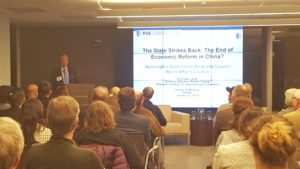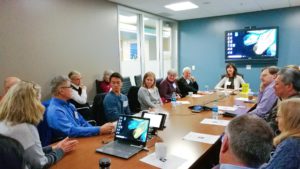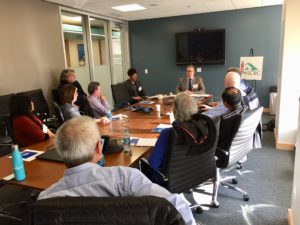 On January 23, 2019, Dr. Nicholas Lardy, the Anthony M. Solomon Senior Fellow at the Peterson Institute for International Economics and a renowned expert on the Chinese economy, presented to a large crowd at the Dorsey and Whitney about his new book, The State Strikes Back: the End of the Economic Reform. Dr. Lardy argued that China’s recent slowing economic growth is not the result of the natural maturing of an economy, but rather may reflect the diminished pace of economic form and the resurgence of the state in resource allocation since President Xi Jinping assumed power in 2012. His talk highlighted numerous examples of the growing tilt towards the state sector, such as the delinking of credit allocation with differences between state and private sector firm rates of return on assets and the impacts of enterprise subsidies.
On January 23, 2019, Dr. Nicholas Lardy, the Anthony M. Solomon Senior Fellow at the Peterson Institute for International Economics and a renowned expert on the Chinese economy, presented to a large crowd at the Dorsey and Whitney about his new book, The State Strikes Back: the End of the Economic Reform. Dr. Lardy argued that China’s recent slowing economic growth is not the result of the natural maturing of an economy, but rather may reflect the diminished pace of economic form and the resurgence of the state in resource allocation since President Xi Jinping assumed power in 2012. His talk highlighted numerous examples of the growing tilt towards the state sector, such as the delinking of credit allocation with differences between state and private sector firm rates of return on assets and the impacts of enterprise subsidies.
BOOK TALK: Conversation with Barbara Finamore, author of Will China Save the Planet?

On December 17, 2018, the Washington State China Relations Council hosted a book talk with Barbara Finamore, author of Will China Save the Planet? Barbara is a senior attorney and Senior Strategic Director for Asia at the Natural Resources Defense Council (NRDC). She has nearly four decades of experience in environmental law and energy policy, with a focus on China for more than 25 years. In 1996, she founded NRDC’s China Program, the first clean energy-focused initiative launched by an international NGO. In 2017, Barbara was named a member of Foreign Policy’s “The U.S.-China 50,” a group of 50 individuals who are powering the world’s most complex and consequential relationship.
As the two largest economies in the world, the United States and China are also the world’s two biggest emitters of carbon. While the Trump Administration has shown itself to be unwilling to address the threat of climate change, including questioning the basic science behind anthropogenic climate change, China sees itself potentially filling this leadership vacuum. China’s ability to play this leading role in the fight against climate change is the central argument of Barbara’s book. She elaborated her thoughts in four key areas:
Coal. China’s rapid economic growth since the onset of economic reforms has come with major, nationwide pollution problems (air, water, and land). Air pollution has drawn the greatest attention. China’s burning of coal is the largest single source of the CO2 emissions in the world, accounting for about 27% of world carbon emissions–about 80 percent of those emissions come from coal. It wasn’t until 2013, when air quality reached unprecedented hazardous levels that the Chinese government started implementing a series of policies, technologies, and market mechanisms to curb coal consumption. Barbara applauded Ambassador Gary Locke, who was in attendance for the book talk, for his efforts to push the Chinese government to provide accurate air quality monitoring data in 2013 while he was serving as the Ambassador to China.
Renewable Energy. While taking various measures to curb carbon emissions, China has also invested massively in renewable energy, especially in wind and solar, and has become a global leader in this space. In 2017, China added nearly as much solar capacity as the rest of the world combined. Compared with the U.S. for the same year, for every dollar that the U.S. invested in renewable energy, China invested three. By 2030, China will have spent $6 trillion on renewable and clean energy. One of the biggest challenges, however, is the integration of renewable energy into the grid system. China’s large-scale investments in renewable energy have brought down the cost of solar and wind globally by 80 percent over the last decade, and solar may become the cheapest form of power generation in five years.
Electric Vehicles. China is spearheading industry advancements. China has invested $58 billion since 2009 to support the development of electric vehicles, including subsidies, R&D, battery storage and charging stations. In 2017, 40% of the world’s electric cars and 99% of electric buses were sold in China. There have been talks about phasing out internal combustion engines in China’s newly manufactured vehicles, even though the Chinese government hasn’t set a precise phase-out date yet.
Green Finance. China is emerging as a leader in green finance, a system that provides incentives to boost private capital investments in green projects. In 2016, China drafted the world’s first comprehensive framework for green finance and launched a green bond market. It is now the world’s second largest green bond market after the United States. China also co-chaired the G-20 green finance committee and played a leading role in forging international consensus in a green financial system.
In conclusion, Barbara pointed out that it is anything but easy for China to combat climate change. We’ve seen tremendous efforts, impressive outcomes, and reasons for hope, but the fundamental economic and political challenges that China faces in addressing this issue will continue to present challenges. China’s future clean energy policy will largely rely on the central government’s political will.
A lively Q&A session followed Barbara’s book talk on opportunities and challenges China, the U.S., and the world are facing regarding climate change.
WSCRC extends special thanks to the author for furnishing refreshments. WSCRC is also honored to have Ambassador Gary Locke at the book talk and extends special thanks for his long-time support for the WSCRC and its work.
Summary Author: Man Wang
Book Talk with Benjamin Shobert, Author of Blaming China: It Might Feel Good But Won’t Fix America’s Economy

On October 11, 2018, the Washington State China Relations Council held the ninth session of the Policy Briefing Series featuring Benjamin Shobert, author of Blaming China: It Might Feel Good But Won’t Fix America’s Economy. In the book, Benjamin described American society as angrier, more fragmented, and more polarized than at any time since the Civil War. He identified deep insecurities about our economic future, our place in the world, our response to terrorism, and our deeply dysfunctional government as contributing to current trade tensions between the US and China. Benjamin is the Managing Director of Rubicon Strategy Group. He is also a Senior Associate for International Health at NBR, where he advises and contributes to NBR research programs on international health in Asia.
Benjamin argued that unless we address an array of domestic issues in the United States, a disastrous chapter in American life is right around the corner. Reflecting on the state of US-China affairs in the present day, Benjamin expressed concern that many Americans may decide that conflict with China is an avenue to secure their economic futures. After framing how the American public thinks about China, Benjamin offered two alternative paths forward. He also proposed steps that businesses, governments, and individuals can take to potentially stop and reverse America’s path to worsening relations with China.
Addressing concerns regarding globalization’s impact on the American economy, Benjamin emphasized that the US-China relationship matters because it has historically benefitted both countries. Citing examples from the twentieth century, Benjamin questioned whether commonly held assumptions such as the inevitability of peace, inter-connectivity breeding mutual reliance, and the folly of war prove applicable in assessing the US-China relationship. He explained how many of the issues raised during President Trump’s 2016 campaign, particularly national anxiety about a rising China, are misplaced. According to the book, China has become an easy target for Americans to project their frustrations with the overall political dysfunction, economic difficulties, and foreign policy blunders since 9/11, much of which in fact has more to do with domestic problems in the United States than with China.
A lively Q&A session followed Benjamin’s book talk. Questions from attendees addressed the possible policy implications following a US-China trade war, as well as the implications of further tariffs issued on imported goods from China. During Q&A, Benjamin cited his own experience traveling to China for the first time early in his career and his own learning process in the field.
WSCRC extends thanks to WSCRC Pearl Member Spencer Cohen for serving as moderator for the event.
Summary author: Mengyao Liu